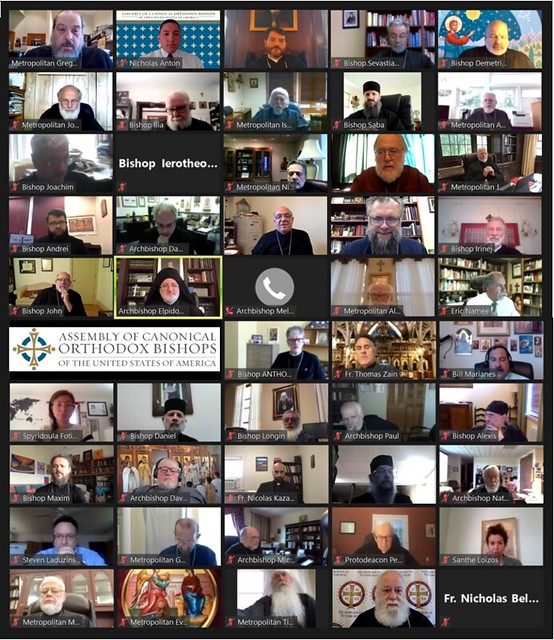We, the Members of the Assembly of Canonical Orthodox Bishops of the United States of America, gathering for our first digital meeting on October 6-7, 2020, offer the perennial message of Christian hope and spiritual encouragement to our clergy and faithful, and all persons of good will, in these unprecedented times of the current global health crisis, political division, and social strife.
The Coronavirus pandemic has affected every human being in the world with some form of trauma: loss of life, debilitating illness, separation from loved ones, financial hardship, or emotional fatigue. And yet, it remains true that through the Cross joy has come into all the world. Through these tragedies, health care workers who have sacrificially cared for the sick, parents who have had to manage every aspect of their children’s education and care from home, those who are without employment and those who are facing financial struggles, and clergy who have maintained the spiritual and liturgical lives of their parishes—all bear witness to the power of love and goodwill to provide solace in these troubled days.
At the same time, this health crisis and the energy required to shoulder it have also given rise to an unhealthy increase of polemical opinion related to questions of science, medicine, and civil and ecclesiastical directives. As often happens when human passions erupt, such polemics have infected other areas of society as reflected in the rise in this country of racial tensions, ideological clashes, and political polarization. We remind all that, as Orthodox Christians sojourning in this land, we are not called to base our lives upon the ephemeral convictions that are common in the realm of politics, economics, or ideology. Rather, we are called to “set your minds on things that are above, not on things that are on earth” (Col. 3:2), placing our trust in the Gospel of our Lord Jesus Christ and doing His Holy Will through our efforts to fulfill His life-giving commandments.
In our present circumstances, trying to hold a sensible middle ground between opposing forces of faithless reason on the one hand and spiritualized folly on the other is the greatest challenge of our time. As Orthodox Christians we are called to follow the “road, I will turn aside neither to the right nor to the left” (Deut. 2:27). Saint Jerome teaches that the high way or royal way is the way of the One who declares, not only that “I am the way, the truth, and the life,” but also “Your ways are not like my way” (Commentary on Isaiah). This means keeping our eyes on Christ and His sacrificial love for the entire world and being humble about our own particular opinions is the time-tested way to walk along the path worthy of the Christian calling.
Certainly, our present physical separation from one another and spiritual isolation from the divine services have complicated our ability to navigate these troubled waters. It is not fitting for us, as Orthodox Christians, to add to the burdens of our brothers and sisters either by condemning them or by appeasing them with insincere flattery. Rather, we ought to honestly fulfill the law of God by bearing one another’s burdens, as the Holy Apostle Paul reminds us (cf. Gal. 6:2). This means that we are called to an authentic life of patient obedience, sincere humility, genuine compassion, and sacrificial love even towards those with whom we differ. This is not an easy task for human beings to accomplish, but by grace and by the power of the Cross, we who are weak are made strong through Christ.
With that grace, let us boldly give expression to Christ-like love and Christ-like humility in a world where many are unable to see anything beyond their own opinion. With that power, let us steadfastly remain faithful to the Tradition of the ancient Church in a land of modernity, uncertainty, and confusion. As a guide, let us “lift up our hearts and hands to God in heaven” (Lam. 3:41) and make our own the words of the Psalmist who cries out: “O God, thou art my God; I seek thee, my soul thirsts for thee, my flesh faints for thee, as in a dry and weary land where no water is” (Psalm 63:1).


















